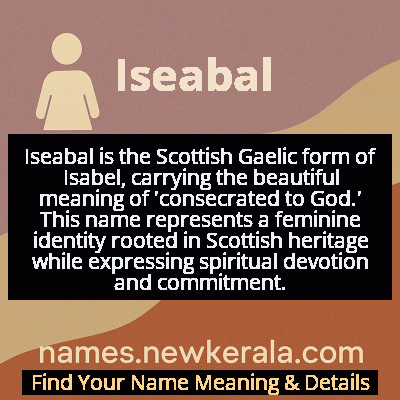Iseabal Name Meaning & Details
Origin, Popularity, Numerology Analysis & Name Meaning of Iseabal
Discover the origin, meaning, and cultural significance of the name ISEABAL. Delve into its historical roots and explore the lasting impact it has had on communities and traditions.
Name
Iseabal
Gender
Female
Origin
Scottish
Lucky Number
4
Meaning of the Name - Iseabal
Iseabal is the Scottish Gaelic form of Isabel, carrying the beautiful meaning of 'consecrated to God.' This name represents a feminine identity rooted in Scottish heritage while expressing spiritual devotion and commitment.
Iseabal - Complete Numerology Analysis
Your Numerology Number
Based on Pythagorean Numerology System
Ruling Planet
Uranus (Rahu)
Positive Nature
Strong sense of order, loyal, practical, and disciplined.
Negative Traits
Stubborn, overly serious, rigid, and prone to feeling restricted.
Lucky Colours
Blue, gray.
Lucky Days
Saturday.
Lucky Stones
Blue sapphire.
Harmony Numbers
1, 7, 8.
Best Suited Professions
Managers, engineers, accountants, organizers.
What People Like About You
Dependability, discipline, practicality.
Famous People Named Iseabal
Iseabal NicDhòmhnaill
Gaelic poet
Noted Scottish Gaelic poet from the Hebrides, known for her lyrical compositions in the oral tradition
Iseabal MacRath
Traditional singer
Preserver of Scottish Gaelic folk songs and contributor to Celtic music revival
Iseabal Stewart
Cultural historian
Author and researcher specializing in Scottish naming traditions and Gaelic culture
Name Variations & International Equivalents
Click on blue names to explore their detailed meanings. Gray names with will be available soon.
Cultural & Historical Significance
In Gaelic-speaking communities, Iseabal symbolized both religious devotion and cultural continuity, serving as a marker of Scottish identity during periods of cultural suppression. The name appears in various historical records, from medieval clan genealogies to 18th-century poetry, demonstrating its enduring significance. During the Highland Clearances and subsequent diaspora, the name traveled with Scottish emigrants, becoming a touchstone of cultural memory in new lands. Today, Iseabal stands as a testament to Scotland's resilient cultural identity and the preservation of Gaelic linguistic traditions against centuries of political and social change.
Extended Personality Analysis
Women named Iseabal are often perceived as possessing a blend of traditional values and independent spirit. They typically exhibit strong moral convictions, reflecting the name's meaning of being 'consecrated to God,' while also demonstrating the resilience and determination characteristic of Scottish cultural identity. Many Iseabals are known for their quiet strength, intellectual curiosity, and deep connection to heritage and family traditions. They often balance practicality with creativity, showing both pragmatic problem-solving skills and artistic sensitivity.
These individuals tend to be deeply principled yet adaptable, capable of maintaining their core values while navigating changing circumstances. The name suggests someone who is dependable yet imaginative, capable of leadership while maintaining humility and compassion for others. Iseabals often demonstrate a particular talent for preserving and interpreting cultural traditions, whether through storytelling, artistic expression, or community leadership. Their strength typically manifests as quiet determination rather than overt aggression, and they're often respected for their integrity and wisdom. These traits align with the historical Scottish ideal of feminine strength—combining grace with fortitude and cultural pride with personal integrity.
Modern Usage & Popularity
In contemporary times, Iseabal remains a relatively rare but cherished name, primarily used in Scotland and among Scottish diaspora communities. While it hasn't appeared on mainstream popularity charts, it maintains a steady presence as a traditional choice for parents seeking to honor their Gaelic heritage. The name has seen a modest revival in recent years as part of the broader Celtic naming trend, particularly among families with strong Scottish connections. Modern Iseabals often appreciate the name's uniqueness and cultural significance, though some may choose to use the more familiar 'Isobel' or 'Isabel' in professional contexts. The name continues to be most popular in Scotland's Highlands and Islands regions, where Gaelic traditions remain strongest, and it's occasionally chosen by parents in other English-speaking countries who want a distinctive name with deep cultural roots.
Symbolic & Spiritual Meanings
Symbolically, Iseabal represents the enduring nature of cultural identity and spiritual commitment. The name embodies the concept of sacred dedication, suggesting a life lived with purpose and moral clarity. It carries connotations of heritage preservation, linking the individual to generations of Scottish women who maintained cultural traditions through challenging historical periods. Metaphorically, Iseabal symbolizes the bridge between ancient traditions and modern identity, between Celtic roots and contemporary life. The name suggests both strength and grace—like the Scottish landscape itself—combining rugged resilience with natural beauty. It represents the idea that personal identity is deeply connected to cultural heritage, and that true strength comes from understanding one's roots while navigating the modern world with integrity and purpose.

